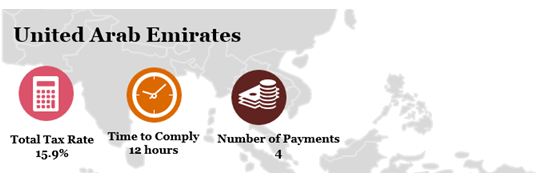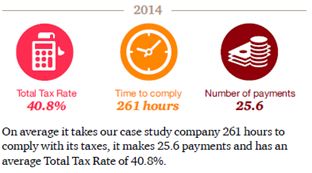PHOTO
Dubai, United Arab Emirates- According to the latest release of the Paying Taxes report by The World Bank and PwC,the UAE continues to maintain its first position in the global ranking for ease of tax payment.
With the least demanding tax framework, well below the world average, the UAE has a total tax rate of 15.9%, four average number of payments and an average time to comply of 12 hours.The report analysed the same factors in 189 countries, with global averages of 40.8% total tax rate, 25.6 average number of payments, and average time to comply of 261.
Despite a small increase in the Total Tax Rate since the previous year, the Middle East region as a whole is the easiest region in which to pay tax. It has the lowest Total Tax Rate and time to comply, and all of the sub-indicators have been stable since 2004.
"The annual report is a powerful index in shaping discussion on tax reform and fiscal policies for many governments. The latest findings from the study reveal that while the region remains the easiest to pay taxes in, the implementation of the VAT will bring a portfolio of new discussions to tax reform," said Dean Kern, Partner, PwC's Middle East Tax and Legal Services Leader.
Recent discussions on the implementation of the VAT in the GCC will transform the tax system in the UAE. The intention is to have a common framework agreed at the GCC level,based on which GCC states will introduce their national VAT systems.
Commenting on the report Jeanine Daou, Partner and Middle East Leader for Indirect Taxes and Fiscal Policy said: "The Paying Taxes report helps inform the discussion around tax reform, a topic that is currently extremely relevant in the GCC. The UAE and GCC governments will need to make strategic decisions concerning key elements in the system, including harmonization of a number of areas across the GCC to make the VAT system fully efficient and compatible with the requirements of a common market. In addition, a certain level of harmonization of rules and simplification across the GCC will help reduce VAT compliance costs for GCC businesses which would contribute significantly to increasing the competitiveness of GCC companies."
She added that, "Another important area of focus for the UAE and GCC governments is to build an effective the tax administration to ensure a smooth and efficient VAT implementation. This will also require the right level of coordination across the GCC notably in terms of exchange of information as well as coordinated approach to monitor and control intra-community trade."
The UAE currently shares an equal first place with Qatar in the overall tax ranking, with a Total Tax Rate of 15.9%, 12 hours and four payments.
Overall ranking for Middle East countries ranking in the global top 50:
· Qatar and United Arab Emirates - 1st
· Saudi Arabia - 3rd
· Bahrain - 8th
· Oman - 10th
· Kuwait - 11th
· Lebanon -45th
*please note that Egypt was ranked 151, but was included in the analysis for Africa and not the Middle East.
Notes to Editor:
The Paying Taxes indicator measures all taxes and contributions mandated by government at any level (federal, state, or local) as they apply to the standardised business. The Total Tax Rate sub-indicator measures the cost of taxes and contributions that are borne by the company which affect the company's financial statements. The taxes included can be divided into five categories: profit or corporate income tax, social contributions and labour taxes paid by the employer, property taxes, turnover taxes and other taxes (such as municipal fees and vehicle taxes). The other two sub-indicators, on the time to comply and number of payments, measure taxes borne and taxes collected, and so include taxes and contributions withheld or collected, such as sales tax or value added tax (VAT).
Paying Taxes 2015 measures all mandatory taxes and contributions that a medium-size company must pay in a given year. Taxes and contributions measured include the profit or corporate income tax, social contributions and labour taxes paid by the employer, property taxes, property transfer taxes, dividend tax, capital gains tax, financial transactions tax, waste collection taxes, vehicle and road taxes, and other small taxes or fees.
For more information about the Paying Taxes study, visit:www.pwc.com/payingtaxes.
The Paying Taxesannual report builds on the World Bank Group's Doing Business reports' chapter on Paying Taxes. For more information on the Doing Business report series, visit:www.doingbusiness.org
About PwC:
At PwC, our purpose is to build trust in society and solve important problems. We're a network of firms in 157 countries with more than 208,000 people who are committed to delivering quality in assurance, advisory and tax services. Find out more and tell us what matters to you by visiting us at www.pwc.com.
Established in the Middle East for 40 years, PwC has firms in Bahrain, Egypt, Iraq, Jordan, Kuwait, Lebanon, Libya, Oman, the Palestinian territories, Qatar, Saudi Arabia and the United Arab Emirates, with around 4,000 people. (www.pwc.com/me).
PwC refers to the PwC network and/or one or more of its member firms, each of which is a separate legal entity. Please see www.pwc.com/structure for further details.
©2015 PwC. All rights reserved
© Press Release 2015























